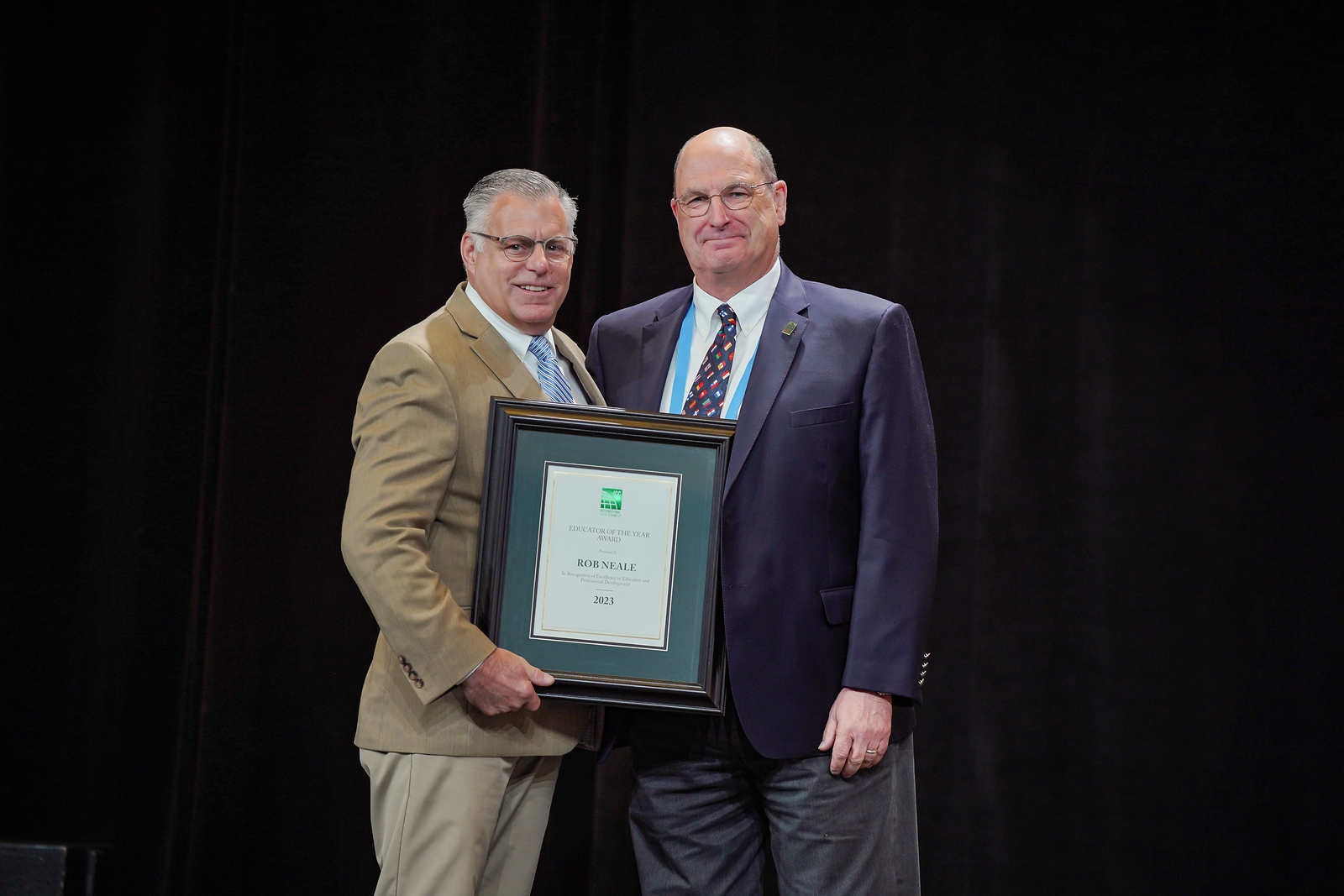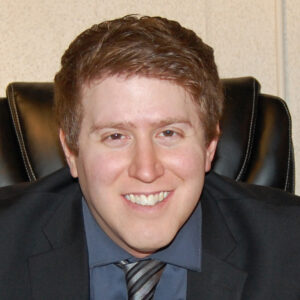
International Code Council’s 2023 Educator of the Year Award Presented to Rob Neale
The Code Council is proud to honor Rob Neale, Principal at Integra Code Consultants and former VP of National Fire Service Activities for the Code Council, with the 2023 Educator of the Year Award.
The International Code Council’s Educator of the Year Award was created in honor of Brent Snyder, a renowned Code Council educator and Past Presiding Officer, and recognizes those who excel in promoting professional development.
This year’s recipient, Rob Neale, Principal at Integra Code Consultants, embodies the very spirit of why the award was introduced. He has been educating code professionals for roughly 40 years.

“This award is really important to me because it validates what I think I’ve been doing right,” said Neale. “It’s really special to be recognized by your peers.”
His validation is well-deserved. Neale strives to help every student learn not only by relying on the traditional methods but also by engaging students with examples. He understands that people may not be initially excited to sit through a three- or six-hour lecture on fire codes, but he wants everyone to feel like they’ve learned something when the class concludes.
Students frequently tell Neale that they appreciate the networking opportunities that his classes provide, as well as the chance to discuss real-world applications with their peers.
“I often get positive feedback about the interorganizational discussions,” said Neale. “I’ll get somebody to prompt a discussion and get someone across the hall and say, ‘Okay, that’s how he or she does it in their jurisdiction, what do you do?’ They’ll engage at that point and say, ‘We do it similarly but differently.’ Somebody else will weigh in and say, ‘We do it entirely differently.’ I often get comments that that’s the most valuable part of the class.”
The Important Role of Building and Fire Code Officials
Like others who have contributed so much to the Code Council, Neale began his career in municipal fire protection. He started as a fire marshal in Bellingham, WA before becoming fire chief at Whatcom County Fire District 3 and the Lynden Fire Departments in Washington. Neale then joined the U.S. Fire Administration National Fire Academy in Emmitsburg, MD.
“I was hired primarily as a training specialist in charge of the Technical Fire Prevention Curriculum, which covered building codes, fire codes, fire protection systems, etc.,” said Neale. “I got promoted to be the Deputy Superintendent for Curriculum and Instruction, which included fire operations, hazardous materials, fire investigation, leadership management topics – things like that.”
Neale then joined the Code Council as Vice President of National Fire Service Activities. His experience in learning, applying and teaching the International Codes® made him the perfect candidate.
“Our job is to protect the health, safety and welfare of people,” said Neale. “And that’s very meaningful. We always talk about police and fire being the first responders but really the building code and fire code officials that do code enforcement play a significant role as well. They don’t always get the credit they deserve as the unsung heroes. They do a lot to contribute to public safety.”
Neale is now in a stage that he describes as “transitional retirement”; he doesn’t want to work full-time but he’s not interested in retiring either.
“Being a code professional, it gets under your skin,” Neale said of his lengthy career. “You feel like you’re contributing something to your community and making it a better place. You know that what you do on a day-to-day basis can be frustrating because it has a lot of rules and regulations. But when you look at the project at the end you go, ‘Yeah, I had an important part of that.’”
Preparing the Next Generation of Building Safety Professionals
As a firefighter, Neale and his team always saw the end result of their work. They’d get a call, put out the fire, clean up and go home. His work in the code industry is a bit different. He, like all code professionals, hopes that the safety features he helped implement into each building are never needed. But at that point, Neale said the work of the code professional may feel a little uncertain.
“Conversely, if you do work on a project and something happens in the building, whatever that may be, and the fire protection works, that’s a huge reward,” said Neale. “You don’t go out and pat yourself on the back and say, ‘Hey, I made sure they put that firewall in correctly.’ But you know internally that the firewall stopped the fire. You saved a lot of lives, a lot of property.”
This is one of the first things that Neale conveys to newcomers as they enter the code world. He also stresses the importance of continuous learning given that technology is always evolving and may be three years or more ahead of any code that’s currently adopted.
“I think the big issue we’re all dealing with right now is energy storage systems, things like lithium-ion batteries and wind energy storage solutions,” Neale explained. “We don’t have a lot of fire or code history with them yet. We’re trying to anticipate future hazards and build in safety features when we really don’t know what the problem is, but it’s important.”
Fire code professionals will need to be aware of every danger, including those most people aren’t aware of or think about. Consider the risks associated with charging a cell phone on a soft, highly flammable surface. Electronic devices may get hot when they’re charging, especially if they are overcharged, creating a massive risk when placed on a bed or pillow. Neale said that a hard surface, such as a desk or countertop, is much safer.
These fire hazards may become more prominent as electric vehicles grow in popularity. They are safe when used as directed but can present significant fire and electrocution risks when charged with homemade solutions or hook-ups that were not designed for their specific vehicle.
“Sometimes what seems like a less expensive way of doing it is probably increasing risk,” Neale warned.
Fire code professionals are therefore tasked with understanding these risks in order to find solutions and to better educate the public.
Last but not least, Neale wants the next generation of code officials to network – not only to learn from their peers but to lean on them when times are tough.
“Everyone has their horror stories. whether it’s political or technical, about something they suffered through in this job,” said Neale. “There’s a big pool of people out there who understand and can sympathize with what it is you’re going through and help support you. That’s equally important to what we do.”
A Highly Rewarding Career Within the Building Industry
Neale said that he is fortunate to have had a great career that’s been guided and propelled by great bosses who have allowed him to grow professionally. He’s taught classes in 40 states to a diverse group of individuals that include seasoned professionals who are about to retire and novices at the start of their career.
“I would say, 30 percent to 50 percent of the time, somebody will come up after class and say, ‘You really helped me understand what this particular topic was, it’s something I can use in my day-to-day work,’” said Neale. “Students tend to be very appreciative when they learn something. When you look around the audience, you see the lightbulb come on in their eyes as they go, ‘Oh, I get it!’ That’s the part I think is really rewarding for an instructor.
Neale’s next class delivery involves commercial kitchen fire protection. This one is designed to go beyond the code and explain how fire protection and ventilation systems work, as well as the different types of construction being used. That same day, he’s scheduled to deliver a class on inspecting and testing fire alarm systems.
“When you teach a code class, you can read what the code says,” Neale added. “But if you don’t understand what the intent is or how the equipment works, or what the systems are intended to do, it doesn’t have as much meaning. I try to take from the text of the code and get it into an application, which would allow people to say, ‘Okay, the code says XYZ and this is how I apply it. This is what I intend to do with it.’ I like to think that’s one of the things I can do, is take that [code] language and turn it into something somebody can use.”
Check out the full list of awards announced at the Code Council’s 2023 Annual Conference and Expo in St. Louis, MO.








